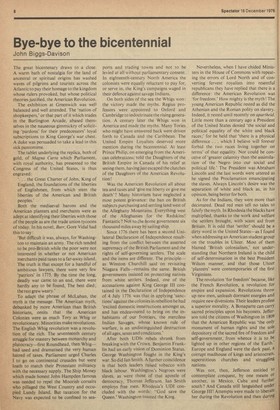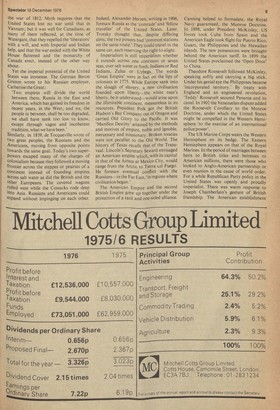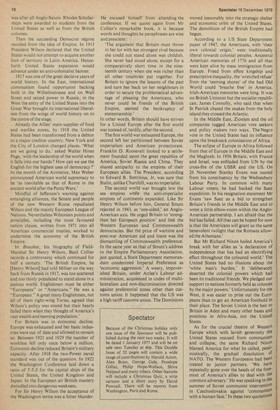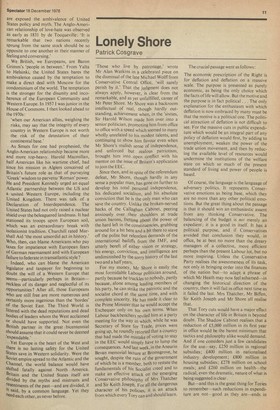Bye-bye to the bicentennial
John Biggs-Davison
The great bicentenary draws to a close. A warm bath of nostalgia for the land of ancestral or spiritual origins has washed waves of pilgrims and tourists across the Atlantic to pay their homage to the kingdom whose rulers provoked, but whose political theories justified, the American Revolution. The exhibition at Greenwich was well balanced and well attended. The 'nation of shopkeepers,' or that part of it which trades in the Burlington Arcade, abased themselves in the nauseous gimmickry of soliciting 'pardons' for their predecessors' loyal subscriptions to King George's war chest. A duke was persuaded to take a lead in this sick pantomime.
The tablet underlying the replica, both of gold, of Magna Carta which Parliament, with royal authority, has presented to the Congress of the United States, is thus engraved: . the Great Charter of John, King of England, the foundations of the liberties of Englishmen, from which stem the liberties of the American and British peoples.'
Both the mediaeval barons and the American planters and merchants were as adept at identifying their liberties with those of the people as are the trade union tycoons of today. In his novel, Burr, Gore Vidal had this to say :
'But difficult it was, always, for Washington to maintain an army. The rich tended to be pro-British while the poor were not interested in whether or not American merchants paid taxes to a far-away island. The truth is that except for a handful of ambitious lawyers, there were very few 'patriots' in 1775. By the time the long, deadly war came to an end, there were hardly any to be found, The best died; the rest grew weary.'
To adapt the phrase of McLuhan, the myth is the message. The American myth, debunked by more American than British historians, omits that the American Colonies were as much Tory as Whig or revolutionary. Minorities make revolutions. The English Whig revolution was a revolution of the rich. The seventeenth century struggle for mastery between monarchy and plutocracy—first Roundhead, then Whig-had used and dramatised the very human hatred of taxes. Parliament urged Charles I to go on continental crusades but were loath to match their Protestant militancy with the necessary supply. The Ship Money which made honest John Hampden famous was needed to repel the Moorish corsairs who pillaged the West Country and occupied Lundy Island. But taxation for the Navy was expected to be confined to sea
ports and trading towns and not to be levied at all without parliamentary consent. In eighteenth-century North America the colonists were equally reluctant to pay for, or serve in, the King's campaigns waged in their defence against savage Indians.
On both sides of the sea the Whigs won: the victory made the myths. Regius professors were appointed to Oxford and Cambridge to indoctrinate the rising generation. A century later the Whigs won in America and made the myths. Many Tories who might have answered back were driven forth to Canada and the Caribbean. The United Empire Loyalists deserved more mention during the bicentennial. At least Prince Philip, on emerging from the American celebrations, told the Daughters of the British Empire in Canada of his relief at seeing them, having just escaped the clutches of the Daughters of the American Revolution!
Was the American Revolution all about tea and taxes and 'give me liberty or give me death'? Many historians have neglected a most potent grievance: the ban on British subjects purchasing and settling land west of the Alleghany Mountains. Everything west of the Alleghanies for the Redskins! Fantastic? Not to the home government six thousand miles away by sailing ship.
Since 1776 there has been a second Unilateral Declaration of Independence resulting from the conflict between the asserted supremacy of the British Parliament and the rights of self-governing settlers. The scale and the items are different. The principle— as Winston Churchill said on revisiting Niagara Falls—remains the same. British governments insisted on protecting natives from white settlers. Indeed, one of the accusations against King George III contained in the Declaration of Independence of 4 July 1776 was that in applying 'sanctions' against the colonies in rebellion he had 'excited domestic insurrections amongst us, and has endeavoured to bring on the inhabitants of our frontiers, the merciless Indian Savages, whose known rule of warfare, is an undistinguished destruction of all ages, sexes and conditions.'
After both UDIs rebels shrank from breaking with the Crown. Benjamin Franklin had an early vision of Dominion Status. George Washington fought in the King's war. So did lan Smith. A further coincidence is that both leaders raised tobacco with black labour. Washington's Negroes were slaves, as were those of that apostle of democracy, Thomas Jefferson. Ian Smith employs free men. Rhodesia's UDI concluded with the words: "God save the Queen.' Washington toasted the King.
Nevertheless, when I have chided Ministers in the House of Commons with repeating the errors of Lord North and of converting fervent royalists into resentful republicans they have replied that there is a difference: the American Revolution was 'for freedom.' How mighty is the myth! The young American Republic rested as did the Athenian and the Roman polity on slavery. Indeed, it rested until recently on apartheid. Little more than a century ago a President of the United States denied 'the social and political equality of the white and black races;' for he held that 'there is a physical difference . . . which I believe will forever forbid the two races living together on terms' of that equality. Nor could he conceive of 'greater calamity than the assimilation of the Negro into our social and political life.' The President was Abraham Lincoln and the last words were uttered as he signed the Proclamation emancipating the slaves. Always Lincoln's desire was the separation of white and black as, in his opinion, being better for both.
As for the Indians, they were more than decimated. Dead red men tell no tales to falsify the myth. In Rhodesia the blacks have multiplied, thanks to the work and welfare the settlers brought, with scant aid from Britain. It is odd that 'settler' should be a
dirty word in the United States as [found when addressing an American student group on the troubles in Ulster. Most of them blamed 'British colonialism,' not understanding that Northern Ireland is the child of self-determination in the best President Wilson manner, and that those Ulster 'planters' were contemporaries of the first Virginians.
The revolution 'for freedom' became, like the French Revolution, a revolution for empire and expansion. Revolutions throw up new men, unleash dormant energies and require new diversions. Their leaders profess a superior morality. A Bonaparte can carrY sacred principles upon his bayonets. Jefferson told the citizens of Washington in 1809 that the American Republic was 'the only monument of human rights and the sole depository of the sacred fire of freedom and self-government, from whence it is to be lighted up in other regions of the Earth. Europe and England were the dark past, a corrupt madhouse of kings and aristocrats, superstitious churches and struggling nations.
Was not, then, Jefferson entitled to contemplate conquest, by one means or another, in Mexico. Cuba and further south? And Canada still languished under George III! Attempts were made to liberate her during the Revolution and then during
the war of 1812. Myth requires that the United States lost no war until that in Vietnam; but it was well for Canadians, as many of them reflected, at the time of Watergate, that they repelled the 'liberators' with a will, and with Imperial and Indian hell), and that the war ended with the White House flattened and the monarchy of Canada erect, instead of the other way about.
Yet the imperial potential of the United States was immense. The German Baron Grimm wrote to his Russian employer, Catherine the Great : 'Two empires will divide the world between them, Russia in the East and America, which has gained its freedom in recent years, in the West ; and we, the people in between, shall be too degraded, we shall have sunk too low to know, except through vague and incoherent tradition, what we have been.'
Similarly, in 1839, de Tocqueville wrote of two great peoples, the Russians and the Americans, moving from opposite points towards the same goal. Today's two superPowers escaped many of the charges of colonialism because they followed a moving frontier across the steppes or prairies of a continent instead of founding empires across salt water as did the British and the Other Europeans. The covered wagons rolled west while the Cossacks rode deep into Asia. Russians and Americans could expand without impinging on each other. Indeed, Alexander Herzen, writing in 1906, foresaw Russia as the 'comrade' and 'fellow traveller' of the United States. Later, Trotsky thought that, despite differing aims, the two powers had 'common stations on the same route.' They could travel in the same car, each reserving the right to alight.
Imperialism is still imperialism whether it extends across one continent or seven seas, over salt water or fresh, Indians or Red Indians, Zulus or Uzbegs. The words 'Great Empire' were in fact on the lips of colonists in 1775. While Europe sank into the slough of slavery, a new civilisation founded upon liberty—the white man's liberty, be it understood—would arise upon the illimitable continent, measureless in its resources. President Polk got the British Hudson's Bay Company out of Oregon and carried Old Glory to the Pacific. It was 'Manifest Destiny' attained by the methods and motives of empire, noble and ignoble, mercenary and missionary. Broken treaties were not peculiar to the Old World. The history of Texas recalls that of the Transvaal. Lincoln's Secretary Seward envisaged an American empire which, with its capital in that of the Aztecs at Mexico City, would range from the Arctic to Tierra Lel Fuego. He foresaw eventual conflict with the Russians—in the Far East, 'in regions where civilisation began.'
The American Empire and the second British Empire grew up together under the protection of a tacit and one-sided alliance. Canning helped to formulate, the Royal Navy guaranteed, the Monroe Doctrine. In 1898, under President McKinley, US forces took Cuba from Spain and the American Eagle took flight for Puerto Rico, Guam, the Philippines and the Hawaiian islands. The new possessions were brought behind the American tariff. In 1899 the United States proclaimed the 'Open Door' to China.
Theodore Roosevelt followed McKinley, speaking softly and carrying a big stick. Under his genial eye the Philippines became 'incorporated territory.' By treaty with England and an engineered revolution, 'Teddy' Roosevelt secured Panama and its canal. In 1902 the Venezuelan dispute added the Roosevelt Corollary to the Monroe Doctrine, under which the United States might be compelled in the Western Hemisphere 'to the exercise of an international police power'.
The US Marine Corps wears the Western Hemisphere on its badge. The Eastern Hemisphere appears on that of the Royal Marines. In the period of marriages between heirs to British titles and heiresses to American millions, there were those who looked to Anglo-American partnership or even reunion in the cause of world order. For a while Republican Party policy in the United States was openly and proudly imperialist. There was warm response to Joseph Chamberlain's gesture of British friendship. The American establishment was after all Anglo-Saxon. Rhodes Scholarships were awarded to students from the United States as well as from the British colonies.
Then the succeeding Democrat regime recoiled from the idea of Empire. In 1913 President Wilson declared that the United States would not attempt to acquire another foot of territory in Latin America. Henceforth United States expansion would advance under an anti-colonialist banner.
1917 was one of the great decisive years of world history. In the East, international communism found opportunist backing both in the Wilhelmstrasse and on Wall Street and seized power in Russia; in the West the entry of the United States into the Great War brought its international liberalism from the wings of world history on to the centre of the stage.
Already the Allies' main supplier of food and warlike stores, by 1918 the United States had been transformed from a debtor to a major creditor country. New York and the City of London changed places. 'What are we going to do,' asked Walter Hines Page, 'with the leadership of the world when it falls into our hands? How can we use the English for the highest uses of democracy ?' In the month of the Armistice, Max Weber pronounced American world supremacy to be 'as inevitable as that of Rome in the ancient world after the Punic Wars.'
Mindful of Jefferson's warning against entangling alliances, the Senate and people of the new Western Rome repudiated Wilson and the mainly European League of Nations. Nevertheless Wilsonian points and principles, including the most favoured nation clause, written from 1971 into all American commercial treaties, worked to undermine the economy of the British Empire.
In Brasshat, his biography of FieldMarshal Sir Henry Wilson, Basil Collier records a controversy which continued for half a century. 'The British Empire, he (Henry Wilson] had told Milner on the way back from Russia in 1917, was too scattered and too thinly populated to stand alone in a jealous world. Englishmen must be either "Europeans" or "Americans." He was a "European." A great many Englishmen, not all of them right-wing Tories, agreed that Wilson's policy was sound but their hearts failed them when they thought of America's vast wealth and teeming population.'
For Britain was in economic decline. Europe was exhausted and her basic industries were out of date and allowed to remain so. Between 1921 and 1929 the number of workless fell only once below a million. Economic decline reduced Britain's military capacity. After 1918 the two-Power naval standard was out of the question. In 1922 the Washington Conference laid down a ratio of 5:5:3 for the capital ships of the United States, the United Kingdom and Japan. In the European air British mastery dwindled into dangerous weakness.
For Sir Henry Wilson the acceptance of the Washington terms was a bitter blunder. He excused himself from attending the conference. If we quote again from Mr Collier's remarkable book, it is because words and thoughts he paraphrases are wise and prescient : 'The argument that Britain must throw in her lot with her strongest rival because she could not stand alone was childish. She never had stood alone, except for a comparatively short time in the nineteenth century when she was richer than all other countries put together. For Britain to ignore the lessons of the past and turn her back on her neighbours in order to secure the problematical advantage of pleasing the Americans, who never could be friends of the British Empire, seemed the bankruptcy of statesmanship.'
In other words, Britain should have striven for a United Europe after the first world war instead of, tardily, after the second.
The first world war exhausted Europe, the second left her partitioned between Soviet imperialism and American protectorate. Franklin D. Roosevelt looked to a settlement founded upon the great republics of America, Soviet Russia and China. They shared antipathy to the empires of their European allies. The President, according to Edward R. Stettinius, Jr, was sure that Stalin, unlike Churchill, was no imperialist.
The second world war brought low the sea empires while the anti-imperialist empires of continents expanded. Like Sir Henry Wilson before him, General Smuts rejected in 1943, as 'one-sided,' an AngloAmerican axis. He urged Britain to 'strengthen her European position' and link the Western European and Commonwealth democracies. But the price of wartime and post-war American aid and loans was the dismantling of Commonwealth preference. In the same year as that of Smuts's address to the Empire Parliamentary Association, just quoted, a State Department memorandum condemned Imperial Preference as 'economic aggression.' A weary, impoverished Britain, under Attlee's Labour administration, acquiesced in codes of multilateralism and non-discrimination directed against preferential zones other than customs union. It happened that the US was a high tariff customs union. The Dominions moved inexorably into the strategic shelter and economic orbit of the United States. The demolition of the British Empire had begun.
According to a US State Department paper of 1947, the Americans, with 'their own colonial origin,' were traditionally liberal towards colonial peoples. Ancestral American memories of 1776 and all that were kept alive by mass immigration from Europe. Freed from effete kingship and prescriptive inequality, the 'wretched refuse' from the 'teeming shores' of the bad Old World could 'breathe free' in America. Irish-American memories were long. It was no British Unionist but the socialist republican, James Connolly, who said that when St Patrick chased the snakes from the holy island they crossed the Atlantic.
In the Middle East, Zionism and the oil companies tugged American vote seekers and policy makers two ways. The Negro vote in the United States had its influence upon the breakneck colonisation of Africa.
The eclipse of Europe in Africa followed from that of Europe in the Middle East and the Maghreb. In 1956 Britain, with France and Israel, was enfiladed from UN by the cross-fire of the USSR and the US. On 26 November Stanley Evans was ousted from his constituency by the Wednesbury Labour Party. In common with many Labour voters, he had backed the Suez expedition. In his resignation statement Mr Evans 'saw Suez as a bid to strengthen Britain's friends in the Middle East and to wrest a little elbow-room within the AngloAmerican partnership. I am afraid that the bid has failed. All that can be hoped for now is that the Americans will grant us the same benevolent twilight that the Romans allowed the Athenians.'
But Mr Richard Nixon hailed America's break with her allies as 'a declaration of independence that has had an electrifying effect throughout the coloured world.' The United States had no illusions about the 'white man's burden.' It 'deliberately deserted the colonial powers which had been its traditional friends. We pledged our support to nations formerly held as colonies by the major powers.' Unfortunately for the West, it was easier to prise out the Europeans than to get an American foothold in their place. The Soviet Union is the heir to Britain in Aden and many other bases and positions in Afro-Asia, not the United States.
As for the crucial theatre of Western Europe which with lavish generosity the United States rescued from communism and collapse, the same Richard Nixon blamed America for what he called, pessimistically, the gradual dissolution of NATO. The Western Europeans had been treated as junior partners. 'We have repeatedly gone over the heads of the foremost of America's allies to deal with the common adversary.' He was speaking in the summer of Soviet communist intervenfion in Czechoslovakia against 'communism with a human face.' In these two quotations
are exposed the ambivalence of United States policy and myth. The Anglo-American relationship of love-hate was observed as early as 1831 by de Tocqueville: 'It is remarkable that two nations recently sprung from the same stock should be so opposite to one another in their manner of feeling and conversing.'
We British, we Europeans, are Baron Grimm's 'people in between.' From Yalta to Helsinki, the United States bares the ambivalence caused by the temptation to make a direct deal with Moscow for the condominium of the world. The temptation is the stronger for the disunity and incoherence of the European Community and Western Europe. In 1957 I was junior in the House of Commons. I then looked ahead to the 1970s: 'when our American allies, weighing the risks, may say that the integrity of every country in Western Europe is not worth the risk of the detestation of their continental base.'
As Smuts for one had prophesied, the Anglo-American relationship became more and more top-heavy. Harold Macmillan, half American like his wartime chief, had since his mission in Algiers conceived of Britain's future role as that of purveying `Greek' wisdom to parvenu 'Roman' power. He and President Kennedy urged an equal Atlantic partnership between the US and a united Western Europe, including the United Kingdom. There was talk of a Declaration of Interdependence. The United States had not only raised a nuclear shield over the beleaguered landmass. It had stationed its troops upon European soil, Which was an extraordinary break with isolationist tradition. Churchill rated Marshall Aid 'the most unsordid act in history.' Who, then, can blame Americans who pay taxes for impatience with European fears of German rearmament and with European failure to federate in transatlantic style?
Indeed, who can blame the American legislator and taxpayer for beginning to doubt the will of a Western Europe that seems—particularly perhaps in Britain— reckless of its danger and neglectful of its Opportunities? After all, those Europeans who are still free are more numerous and certainly more ingenious than the 'hordes' Of the Soviet East. The Third World is littered with the dead reputations and dead bodies of leaders whom the West acclaimed or . should have supported. Not even the British partner in the great bicentennial Should assume that it could never be deemed expendable.'
Yet Europe is the heart of the West and there is no lasting safety for the United States save in Western solidarity. Were the Soviet empire spread to the Atlantic and the Channel, the world balance would have Shifted fatally against North America. Britain and the United States itself are divided by the myths and mistrusts and resentments of the past—and are divided, it is said, by a common language. Yet they need each other, as never before.

















































 Previous page
Previous page